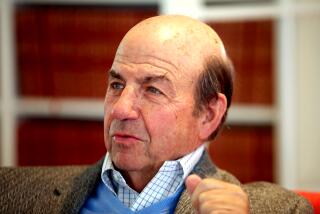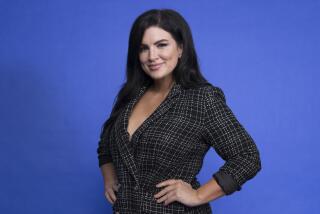COMEDY REVIEW : At 50, George Carlin Still an Angry Man
- Share via
George Carlin may seem to have drifted a ways from the late ‘60s and early ‘70s when he was, as much as any of his fellow comics, a symbol of the era’s counterculture conscience.
After all, Carlin turned 50 last year, an age that is bound to mellow even the hardest case. And then there are those Fuji film commercials--the iconoclastic Carlin, who at one time probably included “The Establishment” on his famed list of dirty words, has become a minor symbol of ‘80s’ consumerism with his TV and radio hawking.
Despite these disquieting signs, there’s really no need to worry. Carlin’s feisty show at the Celebrity Theatre in Anaheim on Friday was evidence that his edge remains unblunted. Once the angry young man, he’s now an angry middle-aged man.
Carlin has always been two comedians: First, there’s the embraceable ironist who whimsically dwells almost sweetly on life’s absurdity and the trouble it gets us into. Then there’s Carlin as social critic, a talking political cartoon whose confrontational wit disembowels anything associated with the right wing.
At the Celebrity, his political bulls-eyes were predictable--President Reagan and his Administration, which Carlin described as “a criminal gang.” Carlin is particularly irked by Atty. Gen. Edwin Meese, who has been a subject of several investigations, some of which are still going on.
Pacing the stage, working body English to communicate his disbelief, Carlin asked the audience to consider the state of the country when “the top-law enforcement official” in a “law-and-order Administration” has been suspected of wrongdoing.
Once that registered, he shifted to Reagan’s support of big business, which Carlin obviously feels is ruining the the nation. “The Administration is against street crime as long as it isn’t Wall Street,” he shouted.
Neither observation was terribly funny, but they showed Carlin’s uncompromisingly liberal slant--a positioning that can be more than amusing fun for leftists, but undoubtedly infuriating for an audience’s more conservative members.
Very infuriating. Carlin is so adamant and opinionated that his show becomes didactic at times, and he takes on the air of a soapbox ranter. Even if you agree with him, it can be a bit much--you yearn for a little laughing gas, a dose of lightheadedness.
Fortunately, Carlin shifts perspective soon enough, as if he knows the political thrust can only be sustained for so long. It’s almost like he’s saying: “OK, you were patient about the lecture, now here’s your reward.”
And the reward is almost always satisfying. Carlin is never better than when he tampers with our expectations about life and points out how surprising, troubling or insane even the smallest components of living can be.
When faced with this realization, he becomes either the helpful adviser on how to get by or the impatient complainer, fed up with it all. In fact, he complains or advises--sometimes in a fizzy, open-hearted sort of way; other times with teeth-clenching venom (traffic makes him really angry)--on just about everything.
In a hilarious bit about “people I avoid,” Carlin suggested we stay away from these characters:
--”Airline pilots wearing two different shoes.”
--”Brain surgeons with ‘born to lose’ tattooed on their hands.”
--”Guys in their 50s named Skip.”
--”Dentists with blood in their hair.”
In a startlingly honest piece about how uncomfortable most people are when faced with another person’s physical handicaps, Carlin audaciously argued that the disabled, through no fault of their own, can be responsible for the uneasiness.
Recalling a time when he shook hands with a man who had two fingers missing, Carlin acted out the meeting, first convulsing into a grimace, then shifting into a phony happy face. “You know how it is when you shake an incomplete hand,” he intoned, “you know, you have to make it seem like it feels really great . . . . You have to become the victim .”
Maybe that seems cruel, and Carlin does have a mean streak that can be a liability. For instance, it was unsettling when he interrupted a clever and affectionate bit on pets with a few cruel lines about beating dogs and declawing cats. Sure, he was lampooning sadistic owners, but the approach’s flippancy tended to trivialize the brutality rather than condemn it.
As he’s done for years, Carlin ended the show with a raw, staccato reading of an ever-growing list of words that have been banned from radio and television. It’s the signature freedom-of-speech anthem for the comic who, in 1973, provoked a five-year Supreme Court battle on obscenity and the First Amendment with his “seven dirty words” piece.
Like the slang in his red-light litany, Carlin can be shocking, even offensive to those who want their comedy censored. But unlike these “dirty words,” there is little question of his redeeming social value.
More to Read
The biggest entertainment stories
Get our big stories about Hollywood, film, television, music, arts, culture and more right in your inbox as soon as they publish.
You may occasionally receive promotional content from the Los Angeles Times.










